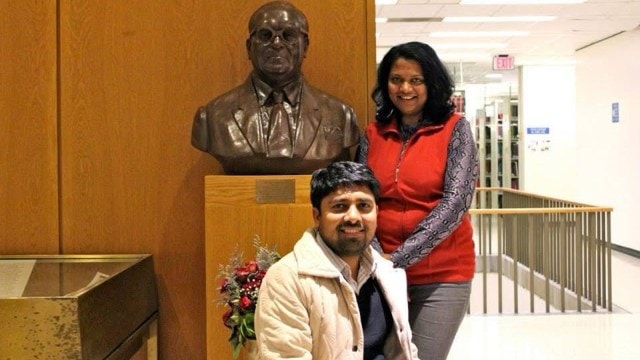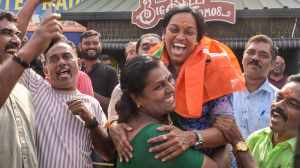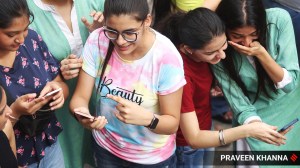How Dalit couple argued own case, won damages for intellectual property loss
It was a fight that would end up in the courts, which sat in judgment on a fundamental question of law: does ‘damage to property’ in the Scheduled Castes and Scheduled Tribes (Prevention of Atrocities) Act include intellectual property (IP)?
 Dalit scholars Dr Kshipra Kamlesh Uke and Dr Shiv Shankar Das won the compensation case on January 24. (Express Photo)
Dalit scholars Dr Kshipra Kamlesh Uke and Dr Shiv Shankar Das won the compensation case on January 24. (Express Photo)With their laptop allegedly stolen and decades of research data destroyed during an alleged eviction attempt by their house owner’s son in Nagpur in 2018, Dalit scholars Dr Kshipra Kamlesh Uke and Dr Shiv Shankar Das say the only option they had was to “fight it out”.
It was a fight that would end up in the courts, which sat in judgment on a fundamental question of law: does ‘damage to property’ in the Scheduled Castes and Scheduled Tribes (Prevention of Atrocities) Act include intellectual property (IP)?
On January 24, a Supreme Court bench of Justices B V Nagarathna and S C Sharma ruled in their favour, upholding a Bombay High Court order of 2023 that expanded the definition of ‘damage to property’ in the Act to include intellectual property, making them eligible for compensation.
Talking to The Indian Express on the phone from an undisclosed location, Uke said, “We were at zero, but in that situation, the only option was to fight it out. And we chose a legal fight because the community to which we belong does not have any other protection, be it religious, social or political.”
Uke says that in 2015, she and Das, both Ph.D. degree holders from Delhi’s Jawaharlal Nehru University, with a specialisation in International Politics and Political Science, rented a house near Deekshabhoomi in Nagpur, where Dr B R Ambedkar embraced Buddhism in 1956 with lakhs of his followers. They had also hoped to fulfill their “dream” of reviving a school that Ambedkar founded to train potential political leaders.
Uke says that while their relationship with the house owner was initially cordial, it all changed in 2016, allegedly after they led a protest rally over the Rohith Vemula case. “It was a rally with 10,000 participants and we marched to the RSS headquarters in Nagpur and also protested against the arrests of JNU students that year. A few days later, the house owner’s son asked us to vacate the house within 24 hours, but we told them that was not possible since we were expecting the birth of our daughter. So we continued living there and paid regular rent,” she said.
Uke says that in September 2018, she and Das returned home from a visit to Delhi to find that the owner’s son had broken into their premises and “stolen raw research data, survey forms, and laptops containing processed data”.
Based on their complaint, the Bajajnagar police station filed an FIR against the house owner’s son and an “accomplice” on charges related to criminal trespassing, wrongful restraint and criminal acts by several persons with common intention. In November that year, provisions of the SC/ST Act were added to the FIR. However, while the couple alleged the role of police personnel in the alleged incident, none of them were named in the FIR.
Months later, the couple approached the National Commission for Scheduled Castes seeking a “proper investigation” into the criminal case and asking for compensation for the IP loss they had suffered.
Uke and Das alleged that they had lost, among other things, raw data on a survey they had conducted in 2014 — as Maharashtra was preparing for Lok Sabha and Assembly elections that year — on the “socio-political awareness amongst the youth of Nagpur”. As part of the survey, they said, they had collected more than 500 samples from students belonging to various educational institutions.
“They damaged most of our belongings and stole our laptops, original degree certificates, passports, certificates of paper presentations and even passports. No police officer was willing to register the complaint. Those were the most important and most valuable things for us as researchers. It was a big blow to our careers and future,” Uke told The Indian Express. The incident, they said, forced them to leave the city and shelve their plans for the training school.
The couple sought a compensation of over Rs 3.91 crore, which they claimed was the “extrinsic value” of the loss they had suffered, with research data estimated at Rs 1.90 crore and damage to other properties at Rs 2.01 crore. They also sought Rs 127.55 crore, which they said was the “intrinsic value” of their property, and included lifelong occupational loss and cost of the proposed training school.
With no progress in the case, in 2021, the couple approached the Bombay HC, seeking the court’s direction to the SC Commission to act on their complaint. In March 2022, the court directed the Commission to act within six weeks on the petitioners’ complaint. In 2022, based on the Commission’s recommendations, the government set up an SIT to investigate the criminal case and the compensation claims. While a chargesheet was filed in a special court in Nagpur, the trial in the criminal case is yet to begin.
On Uke and Das’s demand for compensation, the district authorities wrote to them on June 15, 2022, granting relief to the tune of Rs 5 lakh under certain rules in the Act while saying that there was no provision under the existing Act for additional compensation for damage to intellectual property.
The couple then approached the High Court again later that year with a new plea — seeking a direction to the Collector to grant compensation for damage to IP.
With their case in the High Court, the couple decided to represent themselves. “We consulted lawyers, but most of them lacked an understanding of how the Act applied to evolving instances of caste discrimination. They were reluctant to compensate us when we had suffered personal miseries worth crores. Given that the whole government machinery and the system was against us, we chose to fight the case in court on our own,” the couple said.
The stage was set — two researchers on one side and the State on the other.
With no precedent in India for IP compensation, the couple relied on global IP damage cases. “Everything was new to us. We argued before the High Court in six or seven hearings, with each lasting nearly an hour. It was a tough, lengthy, yet enlightening journey. At every hearing in the High Court, nearly 50 officials from the police and civil administration, including the Commissioner, would be present — the system’s full might,” said Uke.
On November 10, 2023, the Bombay High Court ruled in favour of the researchers. Since the SC/ST Act lacked a clear definition of ‘property’, the court borrowed from the Indian Penal Code, classifying data as “movable property” and affirmed the right of the petitioners to compensation for IP loss.
The court also directed the Nagpur city Collector to assess the claims and ascertain within three months the quantum of IP damage caused to the Dalit scholar couple.
The Maharashtra government, however, went in appeal to the Supreme Court, which on January 24 this year dismissed the case, stating, “We do not find any merit in the Special Leave Petition.”
Calling the compensation a first step, Das said, “People from the Dalit community rely entirely on lawyers, unaware of court processes or how police write documents. Though we won the case for compensation, real and practical justice is still a long journey — for us and for most other Dalits.”
- 01
- 02
- 03
- 04
- 05































